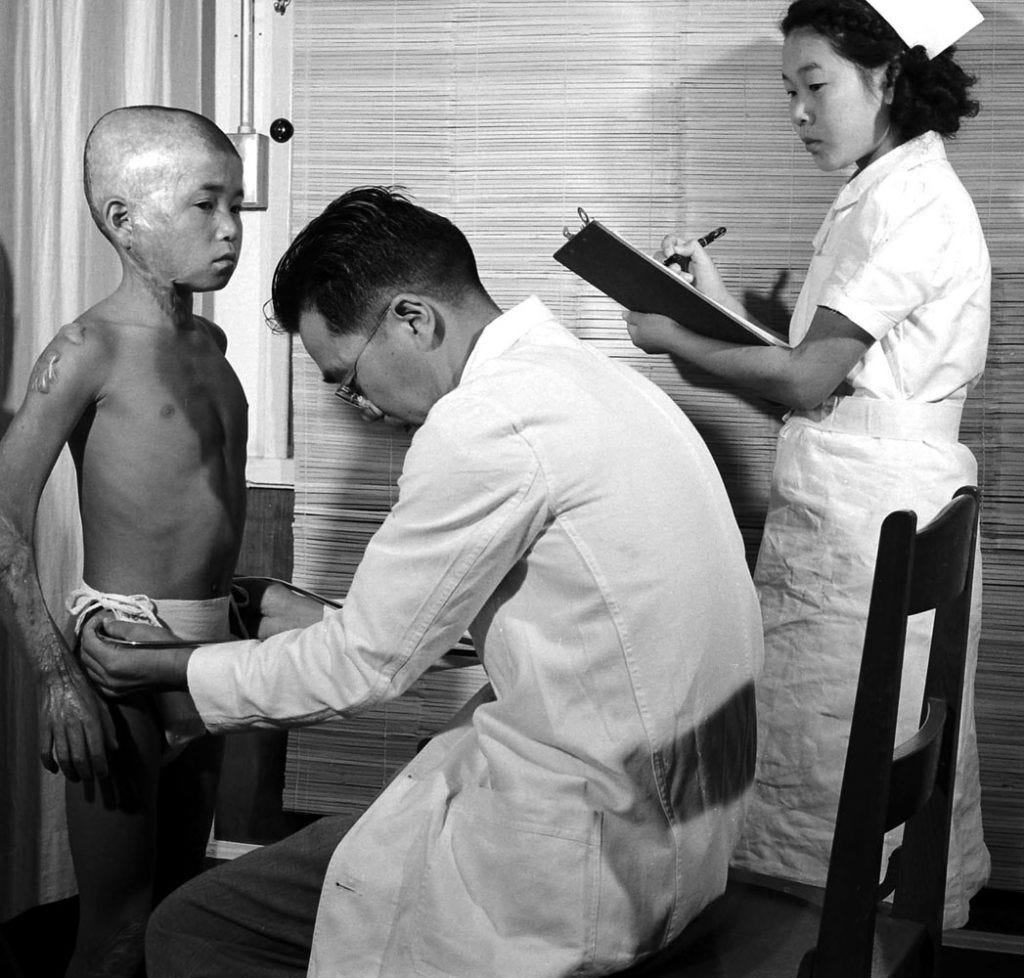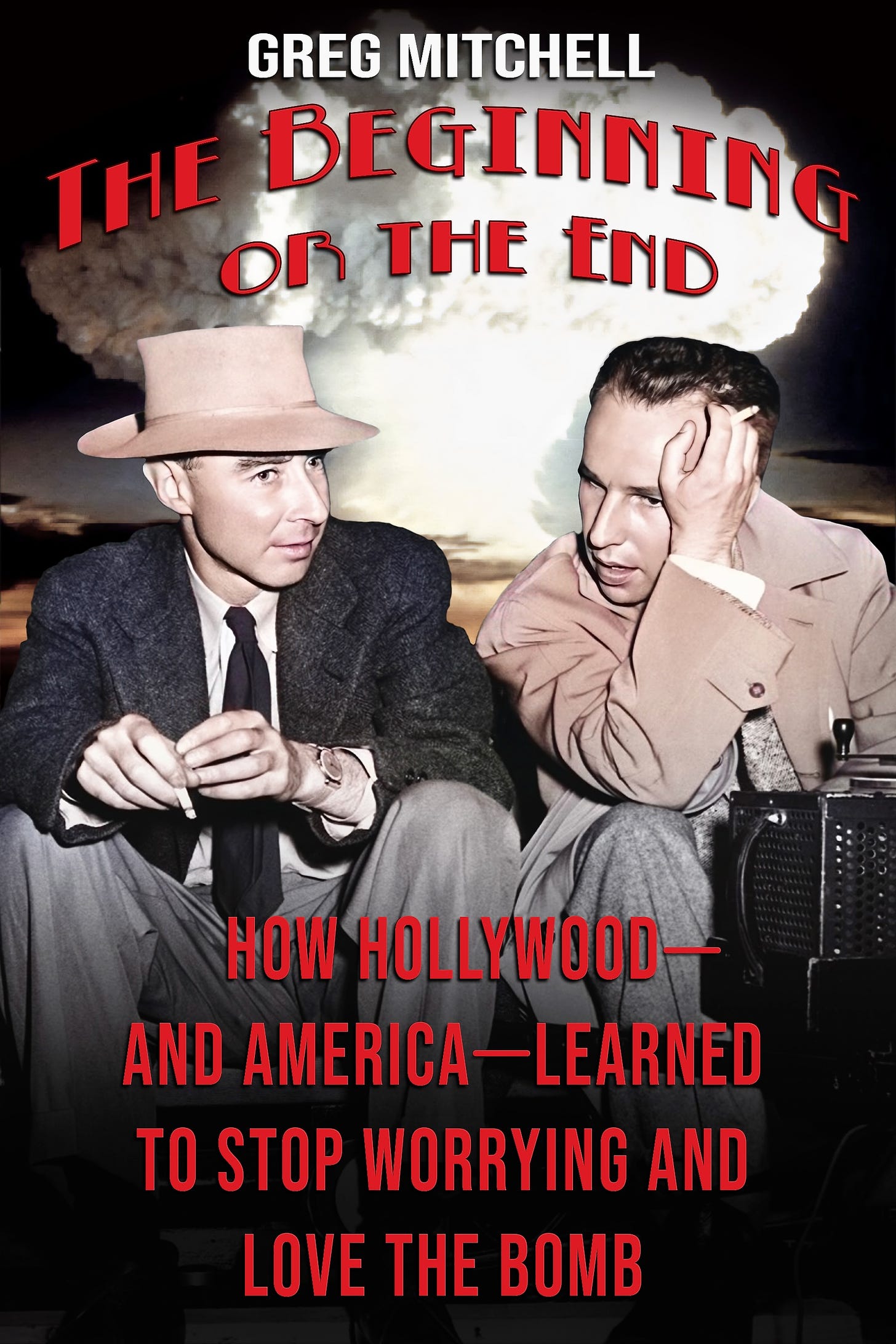Greg Mitchell is the author of a dozen books, including “Hiroshima in America,” “Atomic Cover-up,” and the recent award-winning “The Beginning or the End: How Hollywood—and America—Learned to Stop Worrying and Love the Bomb.” He has directed three documentary films since 2021 for PBS (and “Atomic Cover-up” coming this fall). He has written widely about the atomic bombings for over forty years. You can subscribe to this newsletter for free.
As I've noted in previous posts--and in my recent books Atomic Cover-up and The Beginning or the End--the U.S. after dropping the bombs over Hiroshima and Nagasaki was confronted with a unique publicity (not to mention, moral) problem. Reports from Japan warned of a mysterious new disease afflicting survivors of the twin blasts. Some in Japan were already dubbing it "radiation disease," which was what Robert Oppenheimer some of our other bomb-makers privately expected (though unmentioned in the Christopher Nolan movie)--but still, officials and most in media in U.S. mocked the idea. No one from the West had yet reached either city.
Seventy-eight years ago this week, however, one of the most horrific, if revealing, conversations of the nuclear era took place.
Gen. Leslie Groves, head of the Manhattan Project, had received a telex the day before from Los Alamos, as scientists asked for information on those shocking reports from Japan. Groves responded that they were nothing but "a hoax" or "propaganda." The top radiation expert at Los Alamos also used the word "hoax."
Knowing that the press would be seeking his official response, Groves called Lt. Col. Charles Rea, a doctor at Oak Ridge hospital (part of the bomb project). According to the official transcript, Rea called the reports of death-by-radiation “propaganda,” “hookum,” and "kind of crazy" and Groves joked, "Of course, it's crazy--a doctor like me can tell that!"
But Groves knew it wasn't crazy and he grew agitated as he read passages from the Japanese reports. He even asked, seriously, if there was "any difference between Japanese blood and others." Both men ultimately seized on the idea that everything was attributable to burns--or "good thermal burns," as Rea put it. “They are getting the delayed action of the burn,” he advised. Groves replied, "Of course we are getting a good dose of propaganda"--and blamed some of our scientists and our media for giving the reports any credence.
Groves even bragged, "We are not bothered a bit, excepting for—what they are trying to do is create sympathy." Adding: “This is the kind of thing that hurts us.” (See PDF of transcript.)
But Rea hinted that he knew Groves was merely denying reality, admitting finally, "Of course, those Jap scientists over there aren't so dumb either." Still, in a second conversation that day with Groves, Rea advised: "I think you had better get the anti-propagandists out." One of the great quotes of that time. He also advised, “You will have to get some big-wig to put a countet-statement in the paper.” (That big-wig would end up being….Oppenheimer, again not mentioned in the Nolan movie.)
Five days later, on a visit to Oak Ridge, Groves publicly labelled the reports from Japan propaganda and added, "The atomic bomb is not an inhuman weapon."
Groves' top aide, Kenneth D. Nichols (featured as a key Oppenheimer antagonist in the Nolan movie), would admit in his 1987 memoirs that "we knew that there would be many deaths and injuries caused by the radiation.…"
_____
If you missed this comment on my post yesterday about Oppenheimer signing off on MGM movie about The Bomb while Eintein resisted. The grandfather, of course, was Whittaker Chambers:
My grandfather wrote that [Einstein] cover story for TIME:
• cover: https://content.time.com/time/covers/0,16641,19460701,00.html
• story: https://content.time.com/time/subscriber/printout/0,8816,803775,00.html
In the piece, my grandfather himself described the bomb as "the biggest boost humanity has yet been given toward terminating its brief history of misery and grandeur." He also stated, "If the atom bomb blasted the last popular skepticism about Einstein's genius it also blasted man's complacent pride in the power of unaided intellect. At the very moment that it was finally mastered, matter was most elusive and most menacing."








This is a great series --- thanks, especially on behalf of those who don't already know. I spent early childhood in Japan with an amazingly loving Japanese nanny Moriko, so that inspired me to learn the truth years ago since her family was from Nagasaki. Somehow she not only was mature enough not to take it out on me as a U.S. military junior in payback for the atrocity of the U.S. leadership but also was compassionate beyond measure. Perhaps deep grief lends, in song lyrics fashion, to more room in a broken heart. Or a function of national moral injury inspiring countervailing moral behavior.
The denial of atrocity perpetrators cannot be characterized as anything but evil, with infinite love as the only real balm I've found. Moriko as a Buddhist Shinto was more "Christian" than the S. Baptist Truman who dissembled and covered up about the nuclear hell he unleashed as president, that's for sure!